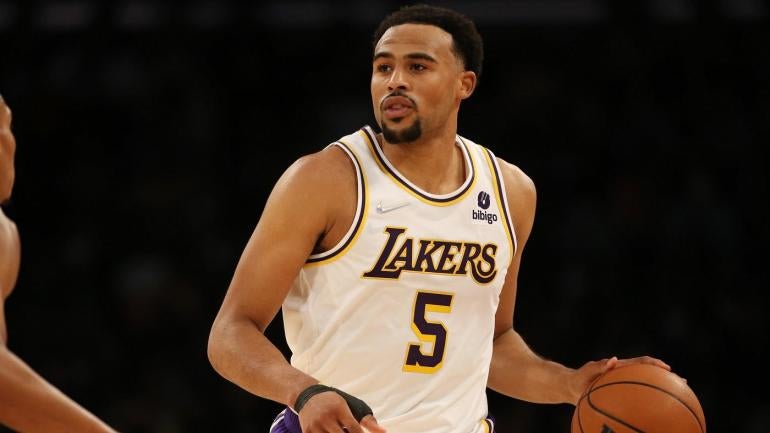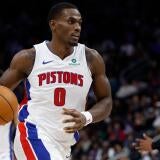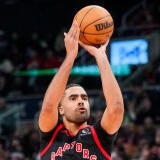
Lakers' Talen Horton-Tucker shines throughout season debut, but makes biggest mark as crunch time initiator
The Lakers were rewarded for their trust in Talen Horton-Tucker Sunday

Frank Vogel didn't mince words on Sunday after Talen Horton-Tucker helped lead the Lakers to a 114-106 (box score) win over the San Antonio Spurs in his season debut. "We invested in him this summer for a reason," Vogel told reporters. "We believe in that young man."
That belief powered a somewhat controversial investment. Horton-Tucker, who averaged only 8.7 points in 71 career games through his first two NBA seasons, was awarded a three-year, $31 million contract this offseason based in large part on potential. That potential was so precious to the Lakers that they refused to deal him for veteran All-Star Kyle Lowry at the 2021 trade deadline, and then chose to pay him over the more proven Alex Caruso in free agency.
What Horton-Tucker seemingly lacked as a shooter compared to those the Lakers turned away, they hoped he could make up for as a ball-handler and defender. The first returns on that investment came on Sunday. Horton-Tucker scored 17 points on 50 percent shooting in a win. His on-ball defense was, at times, as ferocious as the Lakers could have hoped.
But that trust, the belief that led to the big investment that the Lakers made in Horton-Tucker, was most evident down the stretch. The Lakers had previously led the Spurs by as many as 14 points, but San Antonio had whittled the Los Angeles advantage down to two. With 2:41 remaining in the game, Frank Vogel called timeout. The Lakers won the game in the three possessions that followed, all of which were initiated by Horton-Tucker.
It started with his only points of the stretch. Horton-Tucker brings the ball up before dumping it off to Carmelo Anthony. He relocates to the corner while Russell Westbrook and Wayne Ellington try their hand at attacking the basket. Neither succeeds, but in the process have contorted the defense so much that Horton-Tucker has a fairly clean path to the rim. Two points.
He isn't particularly involved in this next play, in which he makes the entry pass to Anthony Davis who then hits Carmelo Anthony for a 3, but that's not the point. Though the fact that he got the rebound likely informs this, for the second consecutive crunch-time possession, Horton-Tucker is bringing the ball up the floor and triggering the initial action. He is, with Westbrook of all people on the floor alongside him, playing point guard.
We see this again on the next possession. With Horton-Tucker initiating the offense, Westbrook hunkers down in the dunker's spot. He's rewarded for it, though, when Horton-Tucker's pass to Davis opens the door for a quick cut to the rim. Two more points.
By this point, the Laker lead is up to nine and the game is effectively secured. Yet Horton-Tucker still takes the next possession in an attempt to score one-on-one. He turns the ball over, but we've now made it through the last four competitive portions of the game without Westbrook running the Laker offense. He is, again, waiting in the dunker's spot.
None of this represents any sort of grand shift in the Laker hierarchy, of course. Westbrook hasn't been supplanted as the team's point guard, and the entire crunch-time offense will reconfigure when LeBron James returns. What it is, though, is a glimpse into what the Lakers envisioned when they constructed this unusual roster.
That first possession was something of a blueprint for the Lakers as they navigate lineups with limited spacing. While Westbrook and Horton-Tucker will likely impede the simple, LeBron-Davis pick-and-roll-centric approach the Lakers have employed over the past two seasons late in games, the tradeoff theoretically comes in how much lineups with so many dangerous downhill drivers can twist defenses out of shape. The impending returns of James and Kendrick Nunn will only give the Lakers more such weapons. It is, in essence, a bet on talent. The Lakers think they have so much of it that they can afford to let Westbrook hamper their spacing off of the ball in the name of spreading the wealth and sprinkling a dose of unpredictability into their offense.
It's a bold and extremely unconventional approach in 2021. There's a reason most teams place such a premium on shooting, after all, and the Lakers know it after winning a championship that way in 2020. But their belief in Horton-Tucker was so great that they chose the harder path this time around, and if Sunday was any indication, he's well worth the investment.


















